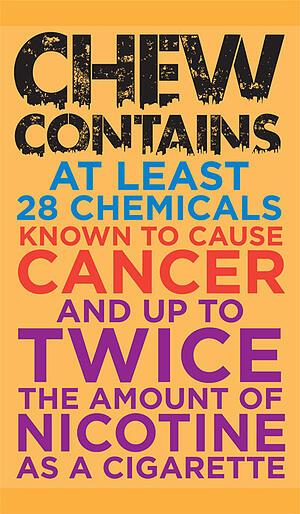The week of February 14-20, 2016 is designated Through With Chew Week, to call attention to the dangers of using smokeless tobacco, which includes chewing tobacco, spit tobacco, dip, snus, and snuff.
The use of smokeless tobacco products remains prevalent in some California communities.1 This is a concern because chew products can contain a higher concentration of nicotine and be more habit-forming than cigarettes. 2,3
Smokeless tobacco products also contain at least 28 chemicals known to increase the risk of developing cancer of the mouth, esophagus, and pancreas. In addition, these products are linked to oral health problems like mouth sores, gum recession, tooth decay, bad breath, and permanent discoloration of teeth.

Warning signs of possible health problems from chew include:
- A lump in the neck
- Change in voice
- A growth or white spots inside the mouth
- Swallowing problems
- Persistent earache
- Blood in saliva or phlegm
- Changes in the skin
1.California Department of Public Health, California Tobacco Control Program. Behavioral Risk Factor Surveillance System (BRFSS). 2013.
2. Centers for Disease and Control. Through with Chew. 2015 http://www.cdc.gov/tobacco/calendar/feb/through_with_chew
3. National Cancer Institute. Smokeless Tobacco and Cancer. 2010. http://www.cancer.gov/about-cancer/causes-prevention/risk/tobacco/smokeless-fact-sheet






